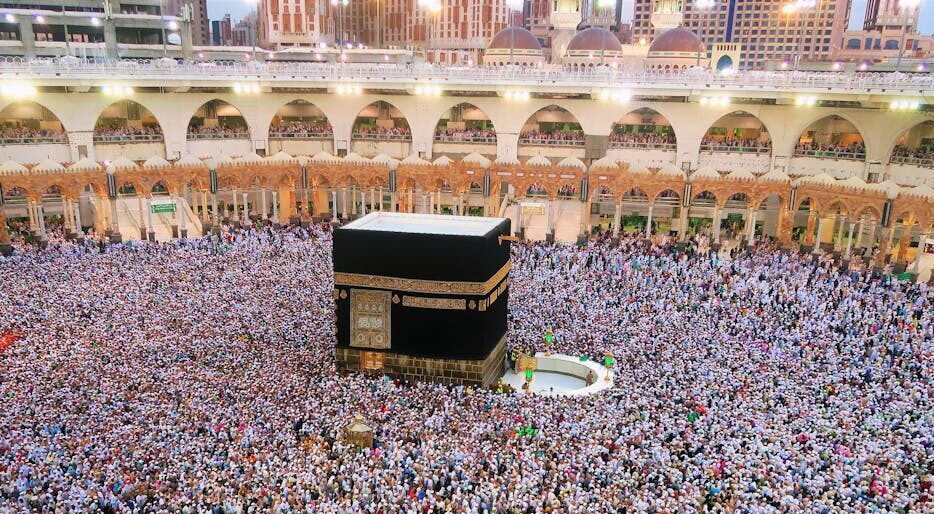
In the Name of Allah—the Most Compassionate, Most Merciful.
Embarking on the spiritual journey of Hajj and Umrah represents one of the most profound experiences in a Muslim’s life. As pilgrims traverse the sacred sites, from the Kaaba in Mecca to the hills of Safa and Marwah, their steps are imbued with duas—or supplications.
These prayers, drawn from the Quran and the Hadith, encapsulate the essence of submission, gratitude, and sincere plea for guidance, strength, and forgiveness.
This blog aims to curate a comprehensive list of duas for Hajj and Umrah, tailored to guide the modern pilgrim through each step of their journey. From the moment of intention (niyyah) to the farewell tawaf, these supplications are your companions.
Read on to learn more about list of duas for Hajj and Umrah.
What Is Hajj?
Hajj is one of the five pillars of Islam, a pilgrimage that every Muslim is required to perform at least once in their lifetime, provided they are physically and financially able. This religious journey takes place during the Islamic month of Dhu al-Hijjah, leading to the holy city of Mecca in Saudi Arabia.
Hajj specifically refers to a series of rituals performed over several days in and around Mecca, including the circling of the Kaaba (Tawaf), walking between the hills of Safa and Marwah (Sa’i), and standing in prayer on the plains of Arafat.
It culminates in the Eid al-Adha, the Festival of Sacrifice, which is celebrated by Muslims worldwide. The pilgrimage not only embodies physical submission to God but also signifies the spiritual journey of Muslims towards a deeper faith and connection with Allah.
What Is Umrah?
Umrah, often known as the “lesser pilgrimage,” is a non-mandatory act of worship in Islam but holds immense spiritual value for Muslims. Unlike Hajj, Umrah can be performed at any time of the year.
The rituals of Umrah include Ihram (a state of sanctity), Tawaf (circumambulating the Kaaba), Sa’i (walking between the hills of Safa and Marwah), and finally, Halq or Taqsir (shortening or shaving the hair).
Though simpler and shorter in its performance compared to Hajj, Umrah offers a unique opportunity for Muslims to cleanse their sins, seek divine mercy, and renew their faith in Allah, all within the serene vicinity of the Kaaba.
Are Duas Accepted During Hajj And Umrah?
The acts of Hajj and Umrah are among the most sacred experiences a Muslim can undertake, times when the proximity to the divine is palpably felt.
The belief in the power of supplication during these spiritual journeys is grounded in numerous hadiths and the Quran, which underscore the importance of prayer and seeking forgiveness from Allah.
Here are some passages and hadiths that highlight the significance of prayer and seeking forgiveness during these sacred pilgrimages:
Quranic Verses:
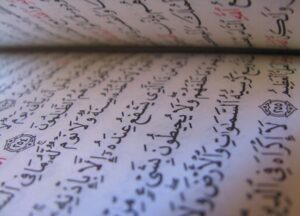
Surah Al-Baqarah (2:199)
Translation:
This verse highlights the act of seeking forgiveness from Allah, especially after performing rituals such as the Hajj.
Surah Al-Baqarah (2:186)
Translation:
This verse reassures Muslims that Allah is always near, listening, and responding to their supplications, emphasizing the closeness of Allah during acts of worship like Hajj and Umrah.
Hadiths:
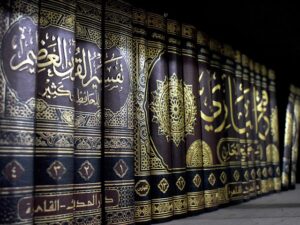
The Prophet Muhammad (peace be upon him) said:
This hadith signifies the importance of supplication on the day of Arafah, a pivotal part of the Hajj pilgrimage, highlighting a specific dua known for its profound simplicity and depth.
Regarding Umrah, the Prophet Muhammad (peace be upon him) mentioned:
This hadith emphasises that those performing Hajj and Umrah are in a special status, indicating that their prayers and requests for forgiveness are particularly likely to be accepted.
These passages and hadiths underscore the deep spiritual connection and the heightened chance of having one’s supplications answered during the sacred acts of Hajj and Umrah. They serve as reminders of the mercy, closeness, and responsiveness of Allah to the faithful, especially during these significant acts of worship.
Make This Dua When Wanting To Go To Hajj
If you’re longing to undertake the journey of Hajj but are faced with obstacles or seeking the means to do so, this dua is for you. It reflects the intent and asks Allah to facilitate the means to perform Hajj:
Dua for Saving Up for Hajj and Umrah

This dua is meant for those who aspire to perform Hajj or Umrah but are currently saving up or seeking the financial means to do so. It’s a prayer asking for Allah’s assistance in facilitating the financial aspects:
Another dua is:
These duas embody the spiritual and practical aspects of preparing for Hajj and Umrah, reflecting the believer’s reliance on Allah for both intention and provision. They are based on the Islamic principles of supplicating for one’s needs, and asking for Allah’s guidance, provision, and facilitation of good deeds.
In Islamic tradition, there’s a wide acceptance of making personal duas, in one’s own words, for any sincere desire or need, including the wish to perform Hajj and Umrah.
Muslims are encouraged to make dua in any language and to express their specific needs and desires to Allah, as He understands all languages and knows the intentions behind all requests. The essence of dua is in its sincerity, faith, and trust in Allah’s wisdom and timing.
Dua for Intention to Make Hajj
For the intention (niyyah) to perform Hajj, which is a crucial step before embarking on this spiritual journey, the following dua can be made. This supplication reflects the pilgrim’s commitment and seeks Allah’s acceptance and help in fulfilling this important pillar of Islam:
Allahumma Innee Ureedul Hajja fa Yassir-hu lee wa Taqabbal-hu Minnee.
Translation:
It’s important to note that making the niyyah (intention) for Hajj is a personal moment between the believer and Allah. The intention is made in the heart, and articulating it through dua adds to the spiritual preparation for the pilgrimage.
Dua for Travelling

For those embarking on the journey of Hajj, the Prophet Muhammad (peace be upon him) taught a specific dua for traveling, which can also be recited when setting out for Hajj. This supplication seeks protection, guidance, and ease during the journey:
Transliteration: Bismillah, tawakkaltu ‘alallah, wa la hawla wa la quwwata illa billah.
Translation:
This dua, while general, is particularly poignant when setting out for such a significant journey as Hajj, reflecting the pilgrim’s reliance on Allah for safety, success, and protection throughout the pilgrimage.
It encompasses both the spiritual and worldly aspects of travel, asking for a safe journey and the well-being of those left behind.
Dua Upon Arrival
Upon arriving in Mecca for Hajj or Umrah, it is recommended that dua be made, expressing gratitude and seeking blessings and protection on this sacred journey. Although there isn’t a specific dua solely for the moment of arrival in Mecca, the following supplication embodies humility and seeks protection against all evils.
Transliteration: A’udzu bikalimatillahit-tammati min sharri ma khalaq.
Translation:
Dua Before Entering Ihram
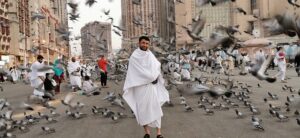
Before entering the state of Ihram, which is the sacred state a pilgrim must enter before performing the rituals of Hajj or Umrah, it is recommended that one recite the following:
| Tasbeeh:
Translation: Subhan Allah (glory be to Allah)
|
Tahleel:
Translation: La ilaha ill Allah (there is no god but Allah)
|
Takbeer:
Translation: Allahu Akbar (Allah is Most Great)
|
You might enter Ihram at the airport within your home country, aboard your flight, or en route to Makkah. Ihram represents a critical component of your Umrah journey. Below is a supplication you can recite as you enter into this sacred state.
Transliteration: Allāhumma innī urīdu l-‘umrata fa yassirhā lī wa taqabbalhā minnī
Translation:
Du’a for Talbiyah for Hajj and Umrah (Intention to Begin Your Worship)
The Talbiyah is a specific supplication recited by pilgrims during Hajj and Umrah when they are in the state of Ihram. It is a declaration of responding to the call of Allah to perform the pilgrimage.
The Talbiyah is recited frequently throughout the pilgrimage, starting from the time the pilgrim enters the state of Ihram until they start the Tawaf (circumambulation of the Kaaba). It is a profound expression of monotheism, submission, and a deep spiritual connection to Allah. Here is the Talbiyah:
Transliteration: Labbayka Allāhumma labbayk. Labbayk lā shareeka laka labbayk. Inna al-ḥamda, wa n-‘imata, Laka wal mulk. Lā shareeka lak.
Translation:
Dua for Tawaf
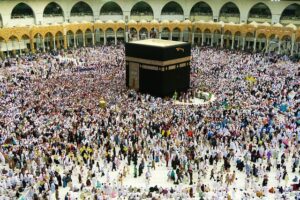
For Tawaf, while there are no fixed supplications prescribed for each circuit around the Kaaba, it’s encouraged to engage in personal dua, dhikr (remembrance of Allah), and recitation of Quranic verses that resonate with you.
Ibn Majah (RA) reported that Prophet Muhammad (PBUH) and his companions would recite the following supplications during their Tawaf:
Arabic:
Transliteration: Subḥāna llāhi wa l-ḥamdu lillāhi wa lā ilāha illa llāh(u), wa llāhu akbar(u), wa lā ḥawla wa lā quwwata illā billāhi l-’aliyyi l-’aẓīm.
Translation: Glory be to Allah. All Praise is due to Allah. There is no god besides Allah. Allah is the Greatest. There is no power or might except with Allah, the Most High and the Most Great.
Arabic:
Transliteration: Allāhumma innī as’aluka l-’afwa wa l-’āfīyata fi d-dunyā wa l-ākhirah.
Translation: O Allah, I ask You for forgiveness and safety in the worldly life and Hereafter.
Throughout the Tawaf, you may also make personal supplications. Remember, Tawaf is a deeply personal act of worship, and it’s an opportunity to connect with Allah, express your innermost desires, fears, thankfulness, and aspirations.
It’s encouraged to use this time to communicate personally with Allah, in whatever language or words resonate with you the most.
Dua When Seeing the Kaaba
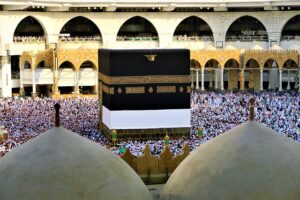
When you first set eyes on the Kaaba, it’s a profound moment of spiritual significance, a time many pilgrims have described as overwhelmingly emotional and deeply moving.
This moment is an opportunity for heartfelt supplication, as it’s believed that duas made upon seeing the Kaaba are not rejected. Here’s a suggested dua that captures the essence of this moment:
Arabic:
Transliteration: Allāhumma zid hādha l-bayta tashrīfan wa ta’żiman wa takrīman wa mahābatan, wa zid man sharrafahū wa karramahū mimman ḣajjahū wa’tamarahū tashrīfan wa ta’żiman wa takrīman wa birran
Translation: “O Allah! Increase this House in honour and reverence and nobility and awe, and increase those who honour and revere it as pilgrims for Hajj and Umrah in nobility and goodness and status and righteousness.” (Ibn ‘Abd al-Barr, Ibn Taymiyyah)
Dua for Entering a Masjid
When entering a mosque, it’s a beautiful practice in Islam to recite a dua, seeking blessings and peace. The Prophet Muhammad (peace be upon him) taught us a specific supplication to say upon entering a mosque, which seeks the mercy of Allah and His protection from wrongdoings. Here is the dua:
Arabic:
Transliteration: Allahumma iftah li abwaba rahmatik.
Translation: “O Allah, open the doors of Your mercy for me.”
Dua to Recite When Near the Hajr-E-Aswad
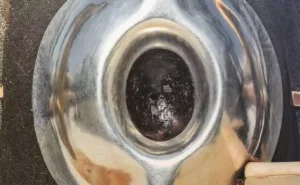
One particular supplication is traditionally recommended upon reaching the Black Stone (Hajar al-Aswad) at the start of each circuit, acknowledging the sanctity of the act and invoking Allah’s greatness:
Arabic:
Transliteration: Bismillahi wallahu akbar
Translation: “In the name of Allah, and Allah is the Greatest.”
Duas to Recite At the Yemeni Corner Of the Kaaba
According to the Mustadrak of al-Hakim, it is documented that when one recites the specified Dua at the Yemeni corner, seventy thousand angels respond with “Amin” to it.
Arabic:
Transliteration: Allāhumma innī a’ūdhu bika mina l-kufri wa l-fāqati wa mawāqifi l-khizyi fi d-dunyā wa l-ākhirah.
Translation: “O Allah, I take refuge in You from disbelief, poverty, and from any humiliation in this world and the next.”
Dua for the Day of Arafah
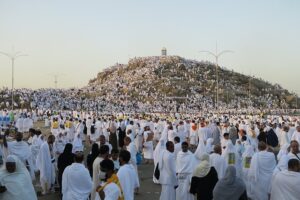
The Day of Arafah holds profound significance in Islam, occurring on the 9th day of the Islamic month of Dhu al-Hijjah during the annual Hajj pilgrimage. Pilgrims gather in the plain of Arafah, located near Mecca, to perform one of the essential rituals of Hajj. On the auspicious Day of Arafah, Muslims often recite the following supplication:
Arabic:
Transliteration: Lā ilāha illa l-lāhu waḣdahū lā sharīka lahū lahu l-mulku wa lahu l-ḣamdu wa huwa ‘alā kulli shay’in qadīr
Translation: “There is no God but Allah alone, with no partner or associate, His is the dominion, to Him all praise is due, all goodness is in His hand, He grants life and death and He has power overall things. ” (Al-Tirmidhi)
Dua for Drinking Zamzam Water
Zamzam water holds a revered place in Islamic tradition and is considered among the most sacred sources of water for Muslims worldwide.
The act of drinking Zamzam water is considered a blessed and spiritually significant practice for Muslims.
The supplication for drinking Zamzam water is:
Arabic:
Transliteration: Allāhumma innī as’aluka ‘ilman nāfi’an wa rizqan ṭayyiban wa ‘amalan mutaqabbalan
Translation: “O Allah! I ask you for beneficial knowledge, and pure sustenance, and accepted actions.” (Ibn Majah)
Dua for Leaving the Masjid
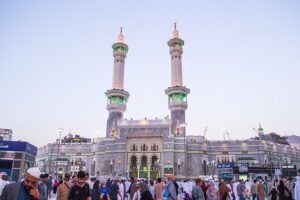
As Muslims conclude their time in the mosque, they recite a dua before leaving. It symbolizes the transition from the sacred space of the mosque back into daily life, carrying with them the spiritual nourishment gained from prayer and devotion.
Arabic:
Transliteration: Bismil-lah wassalatu wassalamu AAala rasoolil-lah, allahumma innee as-aluka min fadlik, allahumma iAAsimnee minash-shaytanir-rajeem.
Translation: “In the name of Allah, and prayers and peace be upon the Messenger of Allah. O Allah, I ask You from Your favour. O Allah, guard me from the accursed devil.”
Dua for Sa’ee
As pilgrims perform the Sa’i, the ritual of walking between the hills of Safa and Marwa, they often recite the following supplication:
Arabic:
Translation: “Verily, I start with what Allah has started with.”
This prayer acknowledges the origin of the Sa’i ritual, which commemorates the desperate search for water by Hajar (Hagar), the wife of Prophet Ibrahim (Abraham), between the hills of Safa and Marwa in the desert, as described in Islamic tradition.
Dua When Approaching Safa and Marwa
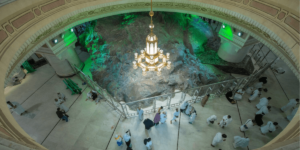
As you head towards the Safa hill, situated within Masjid al-Haram, aligned with the Hajar al-Aswad, it is recommended to recite the following supplication. These supplications should be recited only once before beginning the Sa’i ritual and not at the commencement of each lap:
ِArabic:
Translation: Inna ṣ-ṣafā wa l-marwata min sha’ā’iri llāh(i).
Translation: “Indeed, Safa and Marwa are from the Signs of Allah.”
Arabic:
Transliteration: Abda’u bimā bad’allahu bihi.
Translation: “I begin with that which Allah has begun with.”
Duas to Recite At the Top of Safa and Marwa
Reciting the following supplication at Safa is a Sunnah. After reciting it, you’re encouraged to make your own supplications. Repeat the dua a total of three times, interspersing your personal supplications between each repetition, following the tradition of the Prophet Muhammad (peace be upon him).
Upon reaching the hill of Marwa, face the direction of the Kaaba, raise your hands in supplication, and repeat the same supplications recited at Safa. This marks the completion of one lap of the Sa’i ritual.
Arabic:
Transliteration: Allāhu akbar, Allāhu akbar, Allāhu akbar, wa lillāhi l-ḥamd.
Translation: “Allah is the greatest; Allah is the greatest; Allah is the greatest, and to Allah belongs all praise.”
Arabic:
Transliteration: Lā ilāha illallāh waḥdahu lā sharīka lah(u), lahu l-mulku wa lahu l-ḥamdu yuḥyī wa yumīt(u), wa huwa ‘alā kulli shay’in qadīr.
Translation: “There is no deity except Allah, alone without a partner. To Him belongs the Dominion, and to Him belongs all praise. He gives life and death and He has power over everything.”
Arabic:
Transliteration: Lā ilāha illallāhu waḥdah(u), anjaza wa’dahu wa naṣara ‘abdahu wa hazama l-aḥzāba waḥdah.
Translation: “There is no deity except Allah alone. He fulfilled His promise, supported His slave and defeated the Confederates alone.”
After reciting this Dua, you may recite your own supplications.
Read the Dua a total of three times, making your own supplications in between each time, as was the Sunnah of the Prophet ﷺ.
Summary – List of Duas for Hajj and Umrah
We journeyed through the spiritual essence of Hajj and Umrah, exploring the profound impact of various duas that accompany each pivotal moment of these sacred pilgrimages.
From the initial intentions of embarking on Hajj or Umrah, to the moments of seeing the Kaaba, entering into Ihram, performing Tawaf, and the reflective steps of Safa and Marwah, these supplications form the backbone of a pilgrim’s spiritual dialogue with Allah.
Additionally, the blog covered the dua for entering a mosque, emphasizing the tranquillity and grace that envelops a believer upon stepping into such a sacred space.
Duas discussed not only enriches the Hajj and Umrah experience but also strengthens the believer’s connection with Allah, making these rituals a profound journey of faith, renewal, and spiritual elevation.
Each dua serves as a spiritual milestone, guiding them through their sacred journey, and drawing them closer to Allah with every step and every prayer uttered from the depths of their hearts
Related Articles




